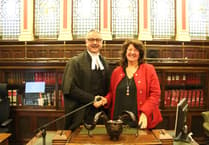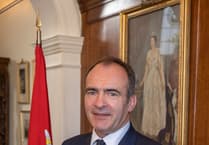Island advocate Ian Kermode made headlines when he claimed the human rights of inmates at Jurby jail have been breached during the Covid lockdown.
Here he tells the Manx Independent why he believes a parallel state of emergency presents a real threat to the personal freedoms of us all.
On March 16, Lieutenant Governor Sir Richard Gozney signed a proclamation declaring a State of Emergency in the Isle of Man in relation to the coronavirus pandemic.
However, it rapidly became apparent that there was another, parallel, state of emergency.
A series of regulations were hastily passed by Tynwald which had the combined effect of restricting personal freedom to an extraordinary extent perhaps never experienced before, not even during the Second World War.
For example, it became a criminal offence to undertake two outdoor walks a day or to continue to run a pub or to socialise at a brother’s home.
This quickly generated feelings of anxiety and panic in many inhabitants, both young and old, significantly affecting their mental welfare as offices, schools and businesses closed and busy streets fell eerily silent.
It was a surreal experience whereby everyday activities suddenly became crimes overnight.
The first Prohibitions on Movement Regulations, passed by Tynwald on March 31, contained a power of arrest by the police and punishment by the court by a fine of up to £10,000 or three months’ custody.
Whereas other jurisdictions enforced breach of similar regulations by way of fixed penalty notices, the Manx regulations did not initially provide for this.
As a consequence, the constabulary commenced what appeared to some as the wholesale arrest of individuals for breach of regulations.
A total of 96 arrests including 15 juveniles were made in a little over two months.
Some 26 adults and one juvenile were subsequently given custodial sentences for breaching the regulations, the adults typically being jailed for one month.
The prison was faced with a sudden influx of prisoners and all new detainees arriving at the prison were initially held on an isolation wing.
All new arrivals were denied any showers, outdoor exercise or phone calls to friends and family for up to two weeks.
In effect such new prisoners, both male and female, were locked in their cells 24/7 with the door only opened once a day briefly for a delivery of food and medication. There are many taxpayers who have commended parliamentarians for responsibly passing requisite legislation, applauded the police for being vigilant and praised the magistrates for sending out a necessarily strong and consistent sentencing message.
On the other hand, there are decent men and women who have been deeply troubled that draconian legislation was passed with negligible public consultation.
They are angry that once good neighbours and friends were swiftly turned by bureaucrats into snoopers and snitchers and concerned that the police have acted in a disproportionate and unduly heavy-handed manner.
There are those who are seemingly quite willing to live in a state of permanent lockdown, happily abrogating all personal independence and responsibility.
Equally, there are also many right-minded folk who have found the recent brief taste of totalitarianism almost unbearable.
What this government has in effect asked its citizens to do is not just stay at home but to blithely agree with the received scientific wisdom and meekly accept without a trace of dissent the advice given out at daily ministerial media briefings.
It is these dark and sinister forces of oppression and conformity which disturb many libertarians.
What they ask for is to be treated as mature adults not as nodding donkeys - to be trusted to reasonably make up their own minds on the available evidence.
In the topsy turvy world of authoritarian politics what apparently counts is not what natural freedoms the state has been justified in taking away from its citizens but what freedoms the authorities believe its well-behaved residents can be permitted to have back.
What is crystal clear is that the principles of democratic accountability, careful scrutiny of legislation, open transparency and proper public consultation have never been more relevant.
Equally, never has it been more important to have a robust political opposition, a quizzical and unshackled press and an independent Manx Bar.
Without these appropriate bulwarks, checks and safeguards much of our cherished way of life is in peril.
However, there is something much more profound at stake.
As the severity of the health crisis recedes it is likely that the official State of Emergency will soon end. But the other, parallel, state of emergency will continue. This is the existential threat to individual integrity; the real danger to our personal liberty, expression and well-being.
Just as the battle against Covid-19 has been described, rightly or wrongly, as a war against an invisible, mysterious and lethal enemy, so the same can equally be said about the spiritual battle against the swirling forces of authoritarianism.
We must resist and fight against this menace to our most fundamental personal liberties, so that we can always be, as we sing in our dear Ellan Vannin nation, ’as free as thy sweet mountain air’.




